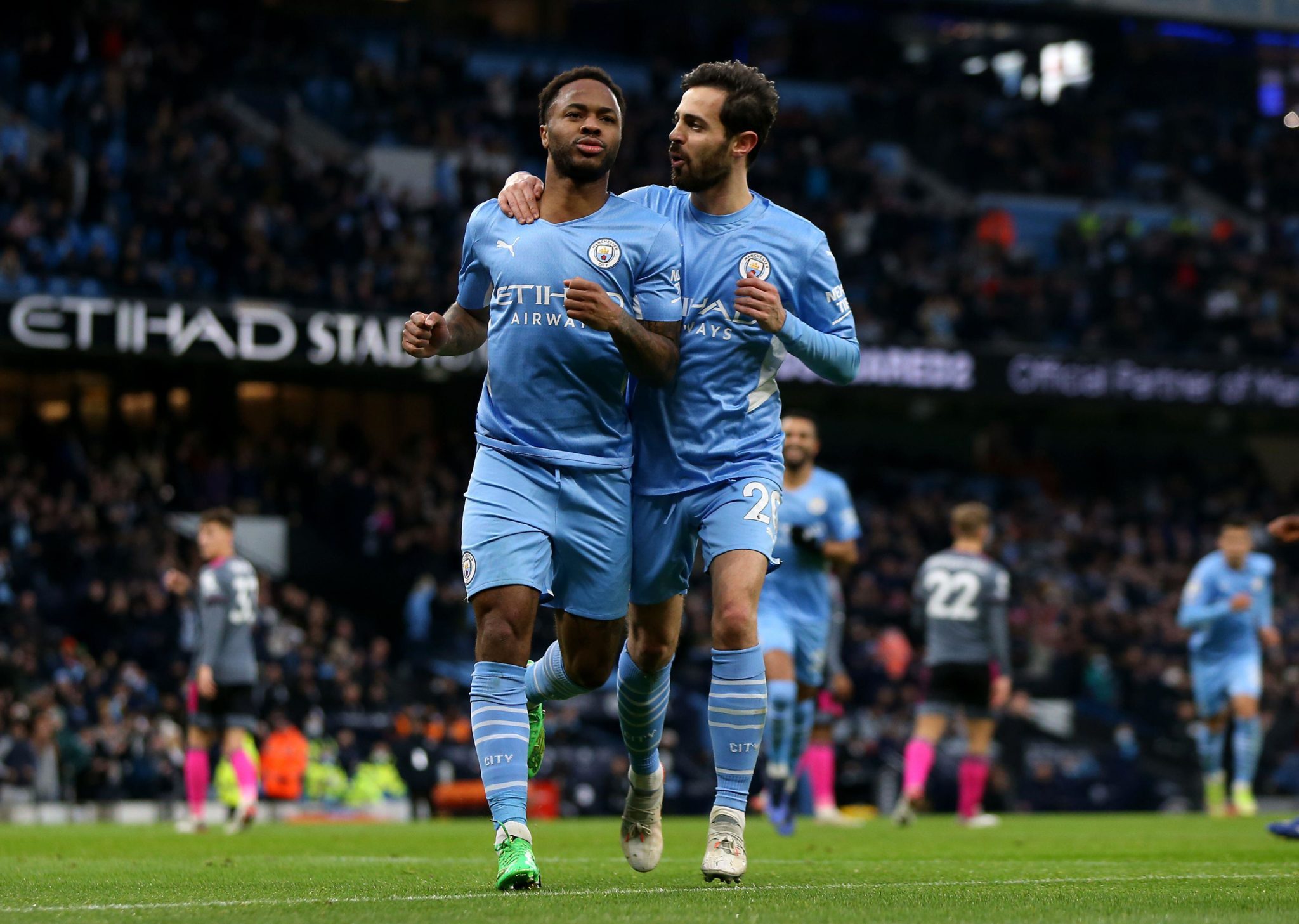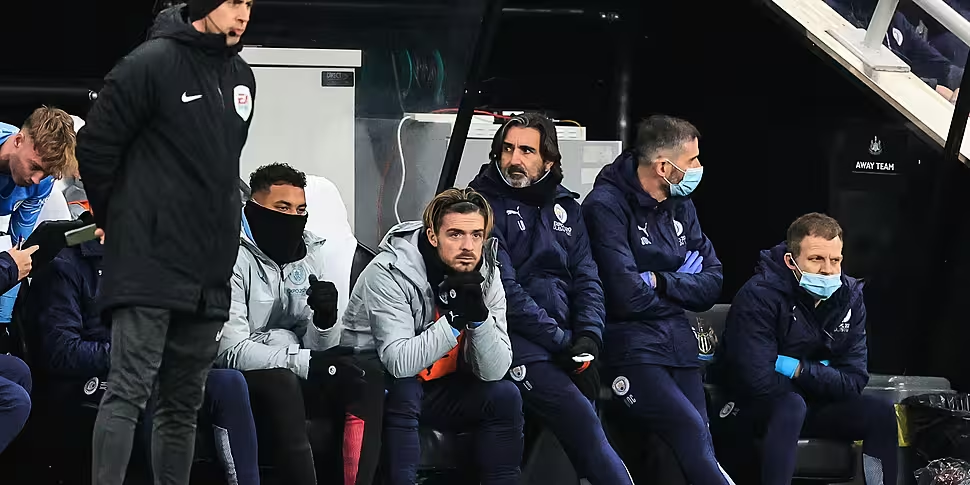Jack Grealish is on his way to winning the Premier League at a canter as just another player in Manchester City's starting XI. Is this a good thing for football?
Manchester City are six points clear at the top of the table.
Liverpool and Chelsea play each other on Sunday, guaranteeing at least one or both of City's closest followers will drop points. If Liverpool and Chelsea draw, and Manchester City beat Brentford on Wednesday night, then City will be eight points clear in January.
Eight points clear before Liverpool lose Mohamed Salah. And before Chelsea lose Edouard Mendy to the African Cup of Nations. It's a major problem. The Premier League title race is likely already over. It will be the third year in a row we haven't had a title race should that be the case.
There are two ways to look at this.
We can either lament Liverpool's lack of investment in their squad and Manchester United's misguided investment in theirs. Or we can recognize that Manchester City are simply spending too much for anyone else to contend. Financial Fairplay rules clearly haven't worked.
According to transferleague.co.uk, Manchester City averages £101.1 million net spend per season. That is £505.6 million over the last five years. No other team has reached £400 million. Manchester United £75.8 per season and Everton averaged £55 million. Arsenal are the only other team above £40 million.
Manchester City already had a title-winning squad five years ago.
Liverpool have kept pace with Manchester City by making exceptionally good signings season on season. But they haven't invested at the same rate as their rivals. It's how they wound up turning to James Milner when chasing the game at Leicester this week. Milner, while still a very valuable player, would be lucky to make the Manchester City bench.
There are lots of different ways to create parity. Sport isn't supposed to be equal footing for every team. The teams with the best players and best managers should win more than they lose. But sport is also at its worst when competition is neutered by financial investment.
For the Premier League, there are different options to undertake.
In the NFL, there is a draft and a salary cap. Teams trade picks and players to one another, but at a financial penalty and there is only one league in the world so it's not comparable. The NBA has a salary cap and a draft too, but it's slightly different in how it works with max contracts and slotted rookie contracts.
Football's transfer market broke itself. Neymar's move to PSG changed the landscape and erased the middle-tier of transfers.
The Jack Grealish transfer captured that. Grealish is an outstanding young, English player. So he was always going to be expensive. But £100 million for a player with his track record was exorbitant. Especially for a team such as Manchester City who didn't really need him. If he hadn't worked out, they'd have just kept Ferran Torres.
That's the benefit of being Manchester City.
You can't put a salary cap on players and teams, nor can you reasonably put a transfer limit on each team. The Premier League has to compete as a league with other nations so they can't handicap themselves for the sake of competition within Britain. But what they can do is make it tougher for players such as Grealish to leave Aston Villa.
 2HC8TM5 Manchester City's Raheem Sterling celebrates scoring their side's fourth goal of the game with Bernardo Silva (right) during the Premier League match at The Etihad Stadium, Manchester. Picture date: Sunday December 26, 2021.
2HC8TM5 Manchester City's Raheem Sterling celebrates scoring their side's fourth goal of the game with Bernardo Silva (right) during the Premier League match at The Etihad Stadium, Manchester. Picture date: Sunday December 26, 2021.According to Spotrac, Manchester City are paying 12 players more than £100,000 per week. That doesn't include Ederson, who can be assumed as the 13th. At least six players are earning at least £150,000 per week. Grealish clocks in at £300,000 per week.
The allure of playing for Pep Guardiola, playing in the Champions League and playing with better players all obviously attracted Grealish to Manchester City. Going from £120,000 per week in salary to £300,000 per week probably played the biggest role.
And that's where the Premier League can level the playing field. Instead of capping all salaries, each Premier League team should have a limited number of slots for players earning £100,000+ per week. Manchester City can field a full team of £100,000+ salary players with a sub to come on too. Brighton don't have a single player earning £100,000 per year.
If each Premier League team could only have five players earning £100,000 per week, then a signing such as Grealish becomes more difficult.
His choice would then be between taking a pay cut to be a secondary player on a top team or be one of Aston Villa's best-paid players and their star. It would force Manchester City to sign actual complementary players and revitalize the middle-tier of the transfer market. City would have to be smarter in what signings they made, rather than adding a £50+ million player every season to get better.
It would also mean you are not restricting the individual earnings of superstar players. A Mohammed Salah could earn £500,000 per week if someone would pay him. He'd still only count as one of the five players no matter how far above £100,000 he goes. More smaller clubs can afford to pay players in the £100,000-£150,000 range, so instead of players earning that money on the benches of the best teams, they can earn it and still play every week.
Transfers and squad construction should be a competition as much as playing on the field should be. The most skilled talent scouts and negotiators should win out. Not the richest.
Liverpool also have 13 players making at least £100,000 per week, but they are in their first phase of building compared to Manchester City started winning titles 10 years ago. Chelsea have 16 players earning £100,000+, but they have some notable misses in there such as Kepa Arrizabelaga and Saul Niguez.
Unfortunately, everyone at the top of football wants the biggest events and the biggest stars rather than consistent quality and competitiveness. It's why we see the likes of Arsene Wenger pushing a biennial World Cup. Big stars and big events sell tickets, sponsorships and tv rights. That's where all the money is.
Our best hope for a more competitive league moving forward appears to be even more billionaires (or countries) taking over clubs.
And that is a whole other level of bleakness.
Jurgen Klopp is a sour loser | Miguel Delaney
Football on Off The Ball, brought to you by Sky.
All the football you love in one place across Sky Sports, BT Sport & Premier Sports.
Download the brand new OffTheBall App in the Play Store & App Store right now! We've got you covered!
Subscribe to OffTheBall's YouTube channel for more videos, like us on Facebook or follow us on Twitter for the latest sporting news and content.









